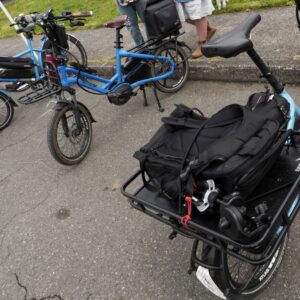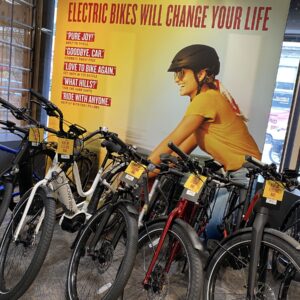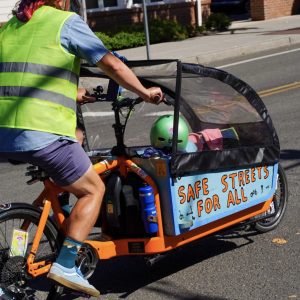
By next summer, low and medium-income Portlanders will be able to walk into a bike shop and receive a significant rebate when they purchase an electric bike. That timeline was just one thing we learned yesterday as staff from the Portland Bureau of Planning & Sustainability presented new details to City Council about their forthcoming e-bike rebate program.
In addition to funding an estimated 6,000 new e-bikes (and adaptive e-bikes!) over the next five years, the program will train mechanics, and launch a program for e-bike parking and storage at multi-family apartment buildings.
Portland’s e-bike rebate program is part of the Portland Clean Energy Community Benefits Fund Climate Investment Plan. That plan, adopted by council in September 2023, pumps $750 million into projects and programs that help Portlanders with low-incomes and Black, Indigenous people of color fight climate change.
The plan includes $20 million for an e-bike rebate program. How exactly the program will be implemented came into clearer focus at the council meeting yesterday. The ordinance will authorize BPS to hire people and/or organizations to run the program. It was a first reading, so councilors and Mayor Ted Wheeler won’t discuss or vote on it until next week.
PCEF Transportation Decarbonization Lead Seetha Ream-Rao framed the program to council as a way to reduce fossil fueled car trips that is, “Absolutely essential to meeting Portland’s net zero goals.”
Ream-Rao cited recent Oregon Household Activities Survey data that the average daily trip in the Portland metro area was six miles and 80% of those are completed with a car. “That [distance] is well within the range of any e-bike on the market today and one of the biggest opportunities for carbon reductions,” she said.








For lower-income Portlanders, an electric car is way too expensive. E-bikes however, would be within reach with a little help in the form of a purchase incentive. Not only would these bikes open up mobility opportunities for more Portlanders, they’d save their owners lots of cash by being able to replace car trips — or in some cases allow families to not own a car or buy a second one.
When the rebate program is in place next summer, people will be able to visit a website, get a voucher, and then receive a point-of-sale rebate at a verified bike retailer. BPS also plans to establish a program to train 50 new e-bike mechanics. The third aspect of the program would create a pilot project aimed at residents of existing mulitfamily buildings to make sure they have secure storage and charging available for e-bikes on the ground floor.
How much will the rebate be? That detail is still unknown. Ream-Rao said they’re discussing the proper amount with retailers and other experts. Portland has modeled parts of its program on the City of Denver, where lower-income participants can receive up to $900 off an e-cargo bike.
Portland’s program will have two brackets, low and medium income (higher wage workers won’t be eligible). While the income brackets haven’t been shared, we learned yesterday the low-income rebate will have three tiers, depending on which type of bike someone wants: standard e-bikes will receive the (unknown) base rebate amount; cargo e-bike buyers will receive the base amount plus $750; and those who have a disability and need an adaptive e-bike will receive an amount based on a percentage of the final cost of the bike (up to a specific amount).
Ream-Rao said they want to remain flexible on the adaptive bike piece of the program, “Rather than trying to make a one-size-fit-all.”
For medium-income folks, there will be a single base incentive that will be less than the low-income incentive.
Whatever the base rebate amount is, Hayes Kenny, who manages River City E-Bikes, said during invited testimony that it should allow participants to buy a bike in the $2,000 to $3,000 range. Kenny said that’s the cutoff for bikes that will be easy to service and will last customers a long time.
Another thing we learned yesterday is that every voucher will come with a $200 “safety incentive” to purchase essentials. “We don’t want to see folks not be able to afford the helmet that they need to be riding these bikes, or a good lock, or the lights,” Ream-Rao said.
Making sure people ride the bikes will be key. In the city of Denver, where an e-bike rebate program was launched in 2022, a survey found that voucher recipients replaced 3.5 car trips and drove an average of 23 few miles in their cars per week.
You can multiply that behavior change by 8,644 because that’s how many Denverites have taken advantage of the program in just two years, said Elizabeth Babcock, who runs the city’s climate office and was invited to speak at council yesterday. Babcock said the program has been, “wildly successful.”
Sarah Iannarone, executive director of the nonprofit The Street Trust, said in her testimony that all these new e-bike riders will need more and better infrastructure. Iannarone said the Portland Bureau of Transportation needs to step up to handle the coming demand. “I think [this program] is going to be incredibly popular here. I also want to talk about the fact that I don’t see PBOT as actively involved as they should be in this,” she said.
The Street Trust has experience getting people on e-bikes through their Ride2Own program. Based on rider data from that program, Iannarone estimates BPS’s e-bike rebates will lead to over 180,000 miles traveled by bike, over 100,000 new bike trips and over 17,000 fewer car trips. “And the infrastructure is not increasing exponentially with it,” Iannarone said, “So we need to tap into the existing infrastructure and capacity at PBOT to make sure these programs roll out in tandem. I cannot stress that enough.”
Having too much demand on bikeways sounds like a good problem to have. But with different types of bikes and a new, battery-powered future, PBOT would be wise to do as much as possible to get ready before the latest phase of the e-bike revolution hits the streets next summer.







Thanks for reading.
BikePortland has served this community with independent community journalism since 2005. We rely on subscriptions from readers like you to survive. Your financial support is vital in keeping this valuable resource alive and well.
Please subscribe today to strengthen and expand our work.
Exciting to see PCEF fund used for something more aligned with what it was created to do. And not only are ebikes cheaper for lower-income (or any!) people to acquire than electric cars/trucks/SUVs, they are also much much much much easier to charge. Those other vehicles are designed with the presumption someone pulls into a garage, or at least a driveway, with a particular kind of vehicle charger installed. My ebike, currently charging in the workplace I do not drive to, in the same outlet as the computer I’m typing this on. I could afford to buy the ebike to get me to the job, but that doesn’t mean I need or deserve it more than those Portlanders who can’t afford the ebike sticker price. That’s why these rebates will matter.
The Ride2Own program seems very cool and I would very much like to see something like this more widely funded by PCEF. It would also be great if BikePortland could do a piece on this program.
Hi. I have done a story on Ride2Own – https://bikeportland.org/2023/09/27/new-program-powered-by-pge-grant-will-fund-90-e-bikes-for-low-income-portlanders-379777 I’m overdue for a follow up!
And yeah, I wonder if anyone will try to use PCEF grant money to do even more of this type of thing?
This is exciting new for Portland. I agree with Sarah Iannarone that PBOT does not seems very well prepared for this. The recent story about the North Park Block and the Green Loop is a great example of how the planning and design is not keeping up with the changing realities of what is increasingly showing up in our bike lanes and MUPs. Take another look at the proposed designs for the bike connection from the North Park Blocks to the Broadway Bridge and imagine that over half the users are on motorized vehicles (e-bikes, scooters, etc). I support the goal of more e-bikes, but I think PBOT and PP&R are not adjusting their design-thinking to accommodate what is coming.
https://bikeportland.org/2024/06/21/parks-reveals-new-concepts-for-north-park-blocks-extension-387863
I agree with the general sentiment “do better.” But what about that connection are you referring to being a problem? What about e-bikes should need special accommodations, in terms of bike routes? I feel like they have basically the same requirements as bikes.
Cargo bikes though, for sure they’ll need more room the more people use them.
I think the main concern is heavier/faster vehicles mixing with lighter/slower ones. I’d rather have that mixing occurring in places that have clearer rules of the road than a path through a park does.
They are designing a relatively narrow MUP with tight switchbacks or a spiral that will be shared with bikes and pedestrians. Also the bike route are proposed to cut through the middle of the park. IMO, it would be much better to segregate the bike traffic form the ADA ped traffic, and keep the bike traffic on the perimeter of the park. Combining bikes and peds likes this just bakes in conflict. This is why the new greenway standard is to provide separate and buffered paths for bikes and peds. The North Park Blocks is brand new, and we already know that MUP conflicts compromise cycling and pedestrian experience AND we know that e-vehicles are increasing every year. The City should simply be applying its own standards and its own experience at a minimum to provide separate routes, but I think bike routes should also have new standards to accommodate e-vehicles. For instance, an e-vehicle will be able to climb much faster than a bike, so wide climbing lanes should be considered. Also, many e-vehicles like cargo bikes are heavier and longer than most bikes, so sharp turns that require really slow movement are not advisable.
The Green Loop™ is not intended to create a well-engineered facility for people walking/rolling for transportation. It’s intended to create “Walk-score™/Bike-score™” green-scaping (green-washing) that can be used to boost real-estate development and, most importantly, real estate profits. Many so-called cycling advocates support this kind of expensive publicly-funded real estate subsidy not because it would markedly improve active transportation networks but rather because they are faddishly enamored with dreams of twee market-urbanist neighborhoods for those who can afford them.
The Green Loop™ is to walking/rolling what The Portland Streetcar™ is to mass transit.
I would love PBOT/PP&R to prove you wrong, but based on the plans presented, it does not look good. I really want to like the Green Loop, but it does appear to be bikewash.
Traditional options are less expensive than the subsidy altogether, and I wouldn’t put “buy new stuff” or “subsidize mostly-Chinese imports” near the top of my list of positive climate actions.
I get that I sound ridiculous for wanting a stipend for actively replacing car trips, but that actually incentivizes the desired end.
Somehow it isn’t crazy to front people money to buy an electric bike to replace a car, something that would seem very, uh, self-financing? They’d get the same reward when they actually use it.
I’m with you on this.
If we want to address transportation emissions we need to directly incentivize the desired behavior (e.g. choosing to not use ecocidal automobiles) instead of subsidizing consumerism. Absent the kind of program that the Street Trust has put together, most purchased bikes/e-bikes will likely sit in garages and collect dust.
There is a much stronger argument for direct subsidies of transit (e.g. paying people $$$$ to use transit) because this transportation mode is growing (recovering) rapidly and is also a mode that makes sense for a larger fraction of the population.
I wonder why adapter kits to convert a bike to an E-bike are not included. Some of them are fairly inexpensive.
Great point, Nomad Cycles professionally installs conversion systems, a converted bike is by nature open source, and right to repair.
I’d like to take part in a subsidy for low-income earners who replace their car with a bicycle. I’ve been a low-income earner for a decade and a half and haven’t owned a car the whole time either. My bike doesn’t even need electricity. I’ve been not driving a lot more than 23 miles per week (a number quoted in the story) for many years – can I get some sort of back pay?
Anyway, I get how this is supposed to help incentivize people to do the “right thing,” but what about those of use who have been doing the right thing for a long time? We get the shaft, right?
Apologies, but you’re just not the consumer we’re looking for. See, we’re trying to sell high margin E-bikes not low margin commuters, and, well, River City just converted an entire store to it, where they used to sell outlet bikes at more affordable prices. They aren’t trying to find the people who buy the bike they can afford, they are trying to find the people who will buy the bike they want.
Unfortunately for you, there seems to actually be a known market of people who won’t buy a $1,000 commuter that they can pedal at 12mph and reap the health rewards from, but will walk into a bike shop and spend $2,250 along with $750 from Portland to grab a $3,000 ebike, that if you read the right study with cooked data, is better for everyone than a regular bike.
The best part is this is the gift that keeps giving to the bike shops, because what these types of bike consumers don’t know is that they will eat brake pads like candy, need brake fluid flushes, new chains, cable adjustments, etc. and that costs surprisingly more than one expects, and just wait for that first new battery.
So, thank you doer of the “right thing”, given your description of your riding habits, you’ll likely find the next chapter on health insurance even more infuriating.
I would like to know how this is gonna work when the Portland Fire Chief Inspector told our hotel that electric bikes are not allowed on property, so I can’t use my electric bike to commute to work anymore.
That sounds like it would make a good subject of an article, as a start. It might be a situation others also face.
Thanks Cheri. I’m in touch with PDX Fire about this and find out what’s going on.
$20 million to buy e-bikes? Seriously? In a city where we can’t sweep the bike lanes nor answer our 911 calls in a timely fashion. Good luck getting the understaffed police to respond when needed. Did the voters truly envision this type of expenditure when they voted yes on the nice sounding PCEF ballot blurb? To me it’s a slush fund that has gotten out of control and needs to be sent back to voters for reform or termination.
Yes, actually. This is exactly the type of thing I wanted to fund when I voted for PCEF.
I agree with Lois, above. To me this is one of the most PCEF things that PCEF funds have been spent on. At least, the stated goal (getting people riding bikes). Many complain that this won’t have the desired effect of getting more people to ride. I think it will, but at least the goal is aligned with PCEF.
“That [distance] is well within the range of any e-bike on the market today and one of the biggest opportunities for carbon reductions,”
That distance is well within the range of any BIKE already in your garage or basement or shed or hallway. And would translate to an even bigger carbon reduction if it were recognized as a valid alternative to driving,
$20,000,000/6,000 bikes= $3,333,33. Free 3 + grand bikes that will probably not be used or sold for cash. What a waste of taxpayer money.
Don’t forget overhead. That will easily take half or more of the total.
Remember they said they were *hiring* someone.
Also fun math, the first housing bond project just opened. $85mm project cost for 206 units, or a cool $420k per unit. 75% of the median single family home cost for affordable apartments, such efficient allocators of capital.
So nothing for folks who would prefer to order an ebike online from an out-of-state retailer. Unfortunate.
Personally, I’m glad the money is staying in Oregon
I love love love this idea. Praying it’s actually implemented
Hi I’m the one in the picture I’m a pastor in the Cully neighborhood
Hi Reginald! Thanks for chiming in. Hope you like the photo. Happy to send you a copy if you’d like. Check your email.
I dont understand why this wouldnt be for everyone. Isnt the goal for lower emissions for our planet? Also don’t the upper income pay more in taxes anyways? Kind of crappy if you ask me and only enables the behavior that if you work less you get more.
Was going to purchase ebike Friday when there is a sale X% off + it’s my birthday. Do I have to wait till program is fully in effect or will a recent receipt be acceptable to qualify for state of Oregon clean air rebate program?